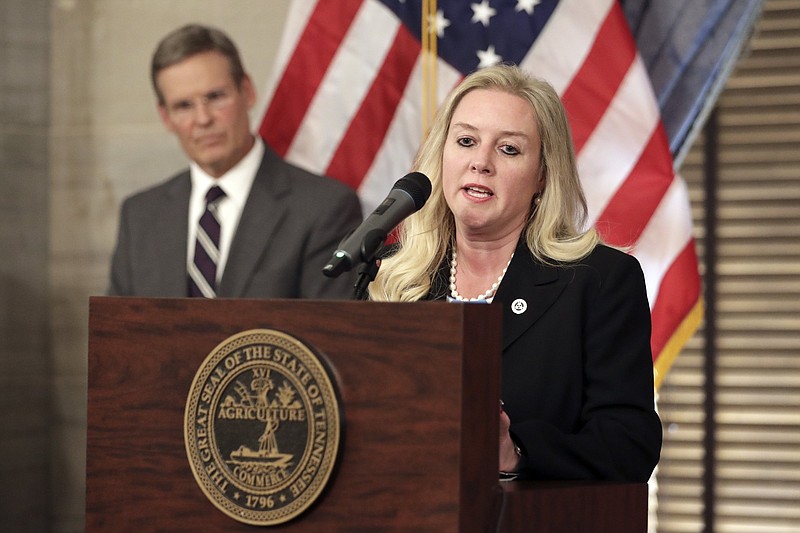NASHVILLE - Tennessee Health Commissioner Lisa Piercey said Tuesday that while her department brought on another 230 people last month to help with critical contact tracing of people exposed to the coronavirus, the department is looking to bring on an unspecified number of additional workers in coming days.
During Gov. Bill Lee's online news briefing on Tuesday, Piercey said in response to questions posed by the Times Free Press that her department has "well above 300 contact tracers and looking to bring on another cohort, probably sometime in June."
The contact tracers interview individuals who test positive for the virus and gain information about their contacts with other people in recent weeks. Then comes trying to find and speak to the people, many of whom likely don't know they had been in contact with someone who later tested positive.
The effort comes as Lee has started lifting many of the economic and social restrictions he had earlier imposed across 89 of Tennessee's 95 counties. The state's six biggest counties (which includes Hamilton) have their own health departments and are deciding on their own measures, although Hamilton County Mayor Jim Coppinger has consistently gone along with actions by Lee, a fellow Republican.
The increased economic and social activity as many businesses as well as public facilities begin opening is expected to spur additional community spread. Lee, a Republican, has said the state intends to keep a close eye on the numbers and percentage increases of new infections even as he issues guidelines, not orders, on what residents and businesses should be doing. He urges Tennesseans almost daily to continue following known safety practices such as washing hands, wearing face masks and social distancing as much as possible.
"As our case numbers grow, our need for contact tracers will grow, and so we're pursuing a couple of different avenues to meet that," Piercey said.
Asked how many contact tracers will be needed, Piercey said, "That's based on how many cases we have."
The commissioner noted her department operates health departments in 89 of the state's 95 counties. The six biggest counties run their own. Her contact tracers are largely dedicated to serving residents in the rural counties, she said.
"The last time I looked [at specific numbers] the 89 rural counties only accounted for about half the cases, and so that's the number we're targeting," Piercey said. "The metro counties have their own contact tracers. We're in frequent contact with them to make sure they have their needs met and working with them to potentially supplement their needs.
"But we know that most of the cases are in the metro areas just because that's where the population is. And so making sure they have enough contact tracers for the metros as well as enough for us in the rural areas."
It was not immediately clear how many contact tracers there are collectively in the six largest counties - Hamilton, Knox, Davidson, Shelby, Rutherford and Williamson.
State House Democratic Caucus Chairman Mike Stewart of Nashville later said Tennessee's preparations fall well short of a position statement recently issued by the National Association of City and County Health Officials. That calls for recommending 30 contact tracers per 100,000 people during a pandemic.
"That would mean just over 2,000 people in Tennessee," Stewart said. "Other states are already putting significant operations in place, with Texas planning to expand to over 4,000 contact tracers and Washington announcing the hiring of 1,500. Tennessee should place itself at the forefront of this effort.
"As the head of the U.S. Centers for Disease Control has observed, contact tracing is essential to getting the economy running again," Stewart said. "That's because carefully tracking the virus keeps infected workers and customers at home and out of the workplace."
Stewart said that "as we have seen in a number of local factories and nursing homes, one infected employee can inadvertently spread the virus to tens or even hundreds of people, leading to dramatic health problems and even death."
Early identification of those who are exposed and potentially infected "keeps the virus isolated and minimizes such preventable outbreaks, making it safer and easier for businesses to operate," Stewart said.
The number of confirmed COVID-19 cases in Tennessee increased to 13,690 on Tuesday, up 119 from Monday's total of 13,571, according to the Tennessee Department of Health's daily virus update. There have been 225 deaths from the virus statewide. Another 204,939 people tested negative, and 6,354 who had tested positive are now listed as having recovered.
Lee has more aggressively pushed testing in comparison to Tennessee's neighbors and has ordered mass testing at all state nursing homes as well as all state prisons in response to outbreaks.
Lee's push on nursing homes and similiar senior care facilites resulted in President Donald Trump inviting the Tennessee governor to the White House last week as the president issued a proclamation declaring May Older Americans month.
Contact Andy Sher at asher@timesfreepress.com. Follow on Twitter @AndySher1.
